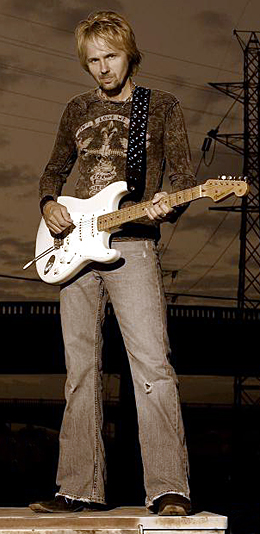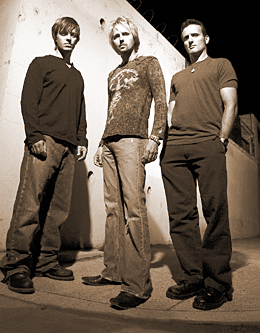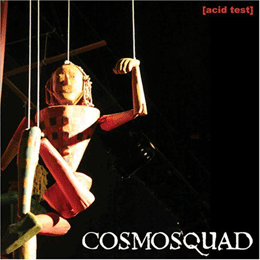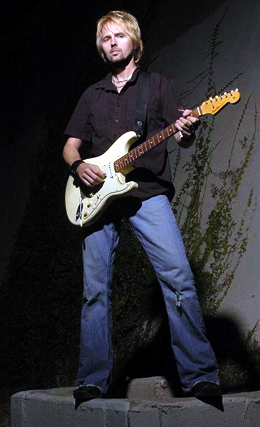by Tom Watson.
 |
|
Jeff Kollman |
Acid Test (Marmaduke), the latest release from Los Angeles-based progressive instrumental rock group Cosmosquad featuring guitarist Jeff Kollman (Glenn Hughes, Sign of 4, Mogg/Way) and drummer Shane Gaalaas (B’z, Diesel Machine), is a broad spectrum, often eerie, nine-track funhouse maze that ranges from hard and dark to soft and bittersweet. It’s the third studio release from the group and their first album since the departure of co-founding member and bassist Barry Sparks, who is now with the metal group, Dokken.
Though not intended as a concept album, it works well as a listen-through experience that invokes a diverse yet related menu of literary and cinematic imagery – the obscure menace of H.P. Lovecraft, sweet and sour shades of Stephen King, and, overall, the “what’s around the corner?” feel of Ray Bradbury’s Something Wicked This Way Comes.
Despite its many unexpected twists and turns, Acid Test retains an organic feel in which even sharp changes in direction from section to section within a tune grow naturally as each track’s tale unfolds through harmonic, rhythmic and dynamic tension and release. The listener is carried along at the feet of a storyteller.
The organic nature of the album has much to do with the musical bond between guitarist Kollman and drummer Gaalaas and the way in which Acid Test was composed. The Kollman-Gaalaas union is now ten years old and represents a number of recordings, performances, and projects in a variety of settings and genres. But, in addition to their joint musical history, the bond springs from a mutually recognized personal affinity – they were born two days apart and share similar backgrounds, both personal and musical.
Kollman and Gaalaas, who co-wrote each of the tracks, based their compositional approach on uncontrived jams and improvisations, using a sketchbook-like technique to grow the various sections of each tune out of an original idea, vibe, or groove. Jamming and improvising are the brushes used to paint their collaborative compositions.
Due to the departure of bassist Barry Sparks, Kollman plays bass (admirably) on four tracks, with the remaining tunes featuring guest bass players Paul Shihadeh, Kevin Chown and Christopher Maloney (who since the recording of Acid Test has become a permanent member of Cosmosquad). Other guest artists include Edward Harris Roth and Jono Brown on keyboards, and a mysterious Willie Dixon character who does the voiceover on “Bedbucket.”
In support of Acid Test, Cosmosquad kicked off a short tour (dates and locations) on September 21 at The Baked Potato in Los Angeles, with additional dates in Illinois and Wisconsin, four of which are in conjunction with Fender-sponsored clinics (Kollman is a Fender clinician). Progressive rock instrumental fans in Chicago can also catch the group at a recently added full show performance on September 30, at The Note. On October 18, Cosmosquad will appear at the Musicians Institute in Hollywood, California.
Below are two on-demand samplers, one from Acid Test, the other a snippet medley showcasing Kollman’s playing.
Jeff Kollman is a busy man. Though currently focused on Cosmosquad, Kollman also does session work, tours with acts such as Glenn Hughes, fronts a power trio called the Jeff Kollman Band (JKB), is a Fender clinician and plays, sings, writes and records for television and movie soundtracks. Guitar International spoke to Jeff on Sunday, September 23, 2007, as Jeff and Cosmosquad were preparing for the road trip in support of Acid Test. But, before leaving Los Angeles, Jeff hit the studio on Monday and Tuesday for a new and as yet un-named recording project with drummer Chad Smith (Red Hot Chili Peppers, Glenn Hughes), bassist Phil Chen (Jeff Beck, Rod Stewart, Keith Richards) and keyboardist Edward Harris Roth (Impellitteri, Glenn Hughes, Fates Warning).
Tom Watson: How was the Cosmosquad gig at The Baked Potato last Friday?
 |
|
Cosmosquad. L-R: Shane Gaalaas, Jeff Kollman and Christopher Maloney. |
Jeff Kollman: The gig was great. The whole first set was pretty much the new record then we came back and did a jam on five or six tunes. The first set is a little bit more “all business” and we kind of went right down the record.
Tom: The Baked Potato’s a great venue.
Jeff: It’s fun. They really let us crank it up because we’re more of a rock band that incorporates elements of other styles of music, but we like to rock. And the drummer, Shane [Gaalaas], hits hard so you’d better put the ear plugs in and fasten your seatbelt. [Laughs]
Tom: Ever catch Michael Landau there?
Jeff: Absolutely. Genius. He’s my favorite L.A. player. In fact, he’s probably my favorite guitar player right now.
Tom: Seem to be some career similarities between the two of you.
Jeff: The difference would be that I’m from a younger generation. He’s about ten years older and grew up here. He’s way deep into the session scene. There are a few cats that have it really nailed because, number one, they’re the best players in town, and number two, they have all the connections. So, I have a similar career, but I don’t do the A sessions that he does. Guys like me scrounge for the scraps. [Laughs] I do a lot of sessions, but it’s a different kind of thing, a lot of indie artists, TV stuff. I’ve figured out ways to create my own niche without having to rely on producers calling me so much. That’s the thing you have to do in this town because a couple of guys kind of have it all wrapped up and they’re not going anywhere.
You get kids that come into MI [Musicians Institute] that are 18 or 19 that just can’t play at the session level because they didn’t spend the time to practice since they were 12. If you don’t have it down by the time you’re 18, I’m not sure you’re going to because by then you have adult responsibilities and it’s hard. They have visions of becoming an L.A. session player, and I’m thinking, “Wait a minute. It’s just not going to happen.” Maybe a rare few.
I think, realistically, if a kid’s 18 or 19 years old and he can play and comes to L.A., if he goes out for auditions he has a very good chance to get on tours with famous artists, absolutely. If some 18-year-old kid in L.A. called me right now that had the right look, that could play, I could easily hook him up with an Avril Lavigne-kind of gig. But, for him to come to town and think he’s going to be a top session player, no way. It’s just not going to happen. He’d have to be better than Michael Landau, and even then, why would Mike’s friends give the kid the gigs? There’s the question of loyalty. Anyway, it’s impossible to be better than Michael Landau at 18 years old. [Laughs] It’s impossible. There are guys that have chops, but it takes years and years and the intangible – the only guy as good as Michael Landau is Jeff Beck, so what are you going to do?
Tom: And you need the session sense, the business sense, the ability to go in, do the job, and get out while the clock’s ticking.
Jeff: Absolutely. To be able to get tones, to read on the fly.
 |
|
Acid Test – Cosmosquad |
Tom: Acid Test. What’s the back story?
Jeff. The thing about Cosmosquad is there’s nothing contrived. We don’t even talk about what we’re going to write or how it’s going to sound. We just get together and do it. For example, Acid Test is a bit heavier, darker, than the other two records, but we didn’t get together and write with that in mind, or say, “Let’s make it sound like this or that.” When we get together we just plug in and jam, record the jam, and say, “That’s cool, I like that, or not.” We don’t discuss it in advance, we just play.
We don’t get together and say, “Hey, I just got the latest Planet X album, let’s sound like that.” In fact, we don’t even listen to music in the same genre. The closest thing to this genre I listen to would be the Michael Landau of recent, but I don’t listen to progressive music. I listen to the Beatles, Radiohead, U2…[laughs]…Van Halen…KISS…AC/DC.
Tom: But, the album sounds compositional.
Jeff: What I’m saying about when we jam is we’ll get together and jam on a vibe or idea and record, then listen to it and go, “This is a cool A section, or this didn’t go anywhere, let’s get rid of this.” We’ll write it compositionally, but the elements are based on jamming.
Take the first song [“Numena”], I didn’t sit in my room prior to getting together and plan it out. I de-tuned my guitar in a sort of interesting way and Shane started going into a 6/8 groove, and there’s the beginning of it. Then I went on to the next riff – you’re probably good for two sections then you go off into a wrong turn and you stop and face it – that was a wrong turn – and we’ll get back on the path. Then I’ll find a melodic section and you’re off to the races.
With Acid Test, especially the first two tunes [“Numena” and “The Spy Who Ate Her”], we’re in a thing where you create a mood and there’s something stirring. You know something coming, but we take our time getting there. You head down a path where it just gets brutal, more and more chaotic, heavier and heavier, but eventually, you get back to the song.
It’s easy to get away from the song, to take turns where you’re on to something completely different and can’t get back.
Tom: If you’re not careful, you drift away.
Jeff: Exactly. That’s what I’m really proud of on the first two songs, especially “The Spy Who Ate Her,” by the time you get to that central riff again you’ve gone through so many sections, and it’s not contrived. It feels like a natural progression through anxiety and chaos.
Tom: There are unexpected turns on many of the tracks, but you’re right, they don’t read like, “We’d better throw in something different at this point for the sake of difference.”
Jeff: Someone asked me what was the most stretching track on the record and I’d have to say it’s the fourth track, “Bedbucket.” It starts out like kind of quirky circus music, fun, but a little twisted sounding. Then it works itself into this underlayer of something along the lines of modern jazz, like Steve Khan, John Scofield, but it’s still a little eerie. Then, eventually, we get into a double time, straight-ahead jazz thing. Shane’s playing just a ride cymbal like Max Roach and all of a sudden a freight train runs right over it with the heaviest, knuckle-dragging, Cro-Magnon brutality – boom – right in the middle of the song it gets crushed by this heavy freight train. Then we bring the original quirky circus melody back in.
Tom: How did you resurrect Willie Dixon for “Bedbucket”?
Jeff: [Laughs] He’s somebody we dug up from the backwoods. That’s a whole other story.
Tom: Let’s hear it.
Jeff: That’s a character created by a guitar player named Brian Poulsen who’s a great instrumental guitar player from Vancouver [Canada]. He and Dave Martone are good buddies. I think Brian used to tour with Shane and created this character named Willie Dixon years ago. Willie Dixon is this twisted, demented, something along the lines of Sling Blade character. So, Shane brought “Willie Dixon” in on that track to do the character voiceover to create another disturbing level.
Tom: Getting back to improvisation, apart from using improvisation to create the sketches from which you compose the tunes, what role does improvisation play in the actual recording and performance of the pieces?
Jeff: Drum fills, guitar solos, everything ends up being improvised. For me, guitar solos are always revised improvisation. Sometimes I’ll play a solo and the first take is “the take,” and sometimes I’ll go, “Ooh, I liked this, I didn’t like that,” and I’ll re-record it. So, basically, it’s all improvisation as far as the solos go.
I don’t know how other guitar players do it. Randy Rhoads sounds like the kind of guy who took his time, wrote a solo, and it’s genius. I come from a little more of a jazz background. The art of jazz is improvisation. You work all day improvising over chord changes. So, when I solo, on these songs [on Acid Test] I didn’t pre-plan them at home. I didn’t go, “Okay, over this part I’m going to play this lick and over that part I’m going to play that lick.” I just don’t do it that way, though I think some rock guitar players do because they might not be completely comfortable improvising.
If you come from a background of jazz playing, it’s all about improvisation. I studied with horn players and guys that play the piano and we just talked about improvisation. So, when I solo I never play it the same way twice. If you listen to the live record, Live at the Baked Potato, I included some of the bits, but the solos are different from the studio versions of the same tune.
Tom: Did you use the VG Strat on Acid Test?
Jeff: I did. “Numena” was actually inspired by a tuning with the VG Strat. Fender had asked me to play at the NAMM Show and demonstrate some of the VG tunings and I thought it would be great to write a song for that. If you’re familiar with the VG, it has a switch that will digitally re-tune the guitar without changing the tension on the strings. Without touching the tuners you can switch to, for example, D-G-D-G-B-D [D modal], which is the tuning for “Numena.” So, that’s how “Numena” started. But, the tale to be told is, when we got together with the bass player for the show he’s like, “This is an opus, I can’t learn this song in a week. Let’s just jam!” [Laughs] We ended up not playing it at the NAMM Show, but that’s the song’s origins.
The last track, “Grossalicious,” that’s the baritone tuning [all strings down a fourth] with the VG Strat.
 |
|
Jeff Kollman |
Tom: The first guitar phrase in “Numena” sounds classical.
Jeff: Even as a kid, I was always very attracted to movie music that was very thematic and powerful, a lot of it with classical influences. That’s why I had a thing for Randy Rhoads’ music since the first time I heard him when I was 13 or 14. I always thought Diary of a Madman [1981 record by Ozzy Osbourne, and the last album on which Randy Rhoads performed before his death in 1982] had so much power, or Carmina Burana by Carl Orff [a cantata written in the mid-’30s, portions of which, especially the “O Fortuna” movement, have appeared in contemporary music, movie soundtracks and commercials]. I never felt like that was captured very often with rock music, and often there was something cheesy when rock artists tried to do it. The Yngwie [Malmsteen] thing is a little bit different the way he portrays it, he comes from more of a Paganini kind of influence.
I like the more Gothic side of it – not from a political standpoint, I don’t like the swords and sorcerers like the metal bands – I like the mood of a song like “Diary of a Madman,” especially the beginning and the ending. I wouldn’t say that’s what the sound of Acid Test is, it’s not, but I have it somewhere in my soul to create a darker side of music, something that’s eerie, and I like music that’s powerful and dynamic.
A friend told me years ago that music isn’t powerful unless you have a really subtle, quiet part so that when you hit them over the head it’s just that much more powerful. If you’re on “10” the whole time it becomes a wall of blur.
Tom: There’s good use of dynamics on Acid Test.
Jeff: I think [when we play] live even more so because there’s no compression and you can bring it down to nothing, really quiet, then when you hit the audience over the head it almost scares them. [Laughs] People can be falling asleep at The Baked Potato until you hit that big Cm chord and everybody starts playing as loud as they can – it’s just great.
Tom: Several, if not most of the tracks on Acid Test have a cinematic feel.
Jeff: We’re definitely on to something. I think this is a transitional stage for Cosmosquad. The more you write and record with the same people, the more you find a definite thing, a sound. When you put certain people together, when you put Roger Waters together with David Gilmour and they get that thing, they end up finding out who they are and the next thing you know it just sounds like Pink Floyd. Tool sounds like Tool, not like anybody else. Eventually, the artists evolve into something you can’t even classify, and I think we’re heading down that path.
We’re so excited by this new record we want to get right back in [the studio] so we can have something out by springtime.
Tom: It doesn’t surprise me that you and Shane are tight considering your history together, but to bring in different bass players for Acid Test and have it come out so cohesive is an accomplishment.
Jeff: Shane and I were born two days apart, and if you look at our childhood photos, we’re identical. Both of our mothers dealt with alcoholism, our first concert was KISS at age 12, it’s scary how we’re connected.
Tom: I can understand you and Shane, but the bass players – there are so many rhythmic elements in this music it must have been difficult to bring in three guest bassists.
Jeff: You just have to beat them. [Laughs] Seriously though, we found guys that were great for specific songs. For example, Paul Shihadeh is very funky and he was the perfect guy for “Lubitorium” and “Swink.” Kevin Chown, who was with me in Edwin Dare, the band I had with my brother [Tommy] and who’s the bass player with JKB, my power trio, was perfect for the ballad [“The Long Walk Goodbye”], and Christopher Maloney is great for laying down the heavy stuff. I would have added Christopher on more tracks but there was a scheduling problem.
Christopher’s now an official member of Cosmosquad. He sees the band from an interesting point of view. He said to me, “I don’t like this kind of music, but your material isn’t like other bands,” meaning he doesn’t care much for most progressive rock bands. He comes from a completely different place from us but he feels that when an audience sees this band it doesn’t matter if they’re male or female, play or don’t play instruments, like or don’t like progressive music, they get what we’re doing because of the dynamics and the power of it. He reminds me all the time that you can’t pigeon-hole this group with the other bands you might find in the same bin at record stores. He thinks the music knocks down barriers, stylistically.
Tom: Seems the emphasis is on instrumental storytelling.
Jeff: The interesting thing is that a guy like Shane has all the chops in the world, but we don’t really show off chops unless the music calls for it. We don’t play fast to play fast. If we do play fast, the song has to get there in a way that makes sense from an emotional standpoint. It’s not like we start a song and it’s immediately, “Wow, listen to all of that technique.” I go for more of the intangible, the way my flesh sounds on the strings, particular chord voicings, a particular tone. It’s not so much about 32nd notes.
Tom: From a listener’s standpoint, we want to hear technique used to tell us something meaningful.
Jeff: Right. You’d be surprised though, there are those few closed-minded guitarists that say, “Man, you’ve got to play fast more often.” [Laughs] I go, “Yeah, listen to another record then ’cause that ain’t me.” Like Michael Landau, he’s got chops but he’s never about that, he’s about building a solo and thoughtful phrasing. Live, he’s the most dynamic guitar player I’ve ever seen, period, and I’ve seen everybody. Man, he brings it down to nothing then hits you over the head with a big, fat, Jimi Hendrix sound, and it’s like, “Wow…great.”
Tom: Acid Test, both within tracks and overall, has a dynamic range from knuckle-dragging hard to heartfelt soft.
 |
|
Jeff Kollman |
Jeff: One thing I always do on a record … I’m a real sucker for a pretty ballad. There’s usually an experience that inspires it. As we get older there are people in our lives that pass on. My mother passed away on January 1 of the millennium so I wrote a song called “In Loving Memory,” (Squadrophenia, 2002, Marmaduke). It’s one of those things that happens – suddenly you’re just playing the song.
Something similar happened with Acid Test. Our manager called and said his mother had just passed away. Since I’ve lost both of my parents, whenever anyone near to me loses somebody it hits so close to home I always pick up a guitar and write a song. So the ballad “The Long Walk Goodbye” on the new album is dedicated to our manager’s mother. I don’t think of the album process as, “Oh, a ballad doesn’t fit in there because we’re doing this thing and it’s dark or eerie or menacing.” We don’t care. We do whatever we want. If the song moved us at the time, we put it on the record.
That’s what I love about this band – we make the creative statement that we want to make. Obviously, there’s no worry about fitting into some commercial category – we don’t worry about radio … [laughs] … it’s like, are you kidding me? We just do what we want to do. The successful payoff is when you do exactly what you want to do and other people dig it. Paul McCartney said that years ago, just write the music you want to write, don’t follow the trends, and if it moves you enough, it will move somebody else, whether or not it’s commercial music.
If you heard a commercial artist on the radio and put a project together to do something similar, by the time you got a record deal together and got it out, that original artist would probably be long gone, the music will sound dated, and the audience will have moved on to a different flavor. You’d end up always chasing a trend. You’re better off not worrying about that and just do your own thing.
Acid Test Track Listing
[Note: all tracks feature Jeff Kollman on guitars and Shane Gaalaas on drums]
“Numena” (Jeff Kollman, bass)
“The Spy Who Ate Her” (Jeff Kollman, bass)
“Lubitorium” (Paul Shihadeh, bass; Ed Roth, keys)
“Bedbucket” (Jeff Kollman, bass; Ed Roth, keys; Willie Dixon, voiceover)
“Goathead” (Christopher Maloney, bass)
“Hindenberg” (Christopher Maloney, bass; Ed Roth, keys)
“The Long Walk Goodbye” (Kevin Chown, bass; Ed Roth, keys)
“Swink” (Paul Shihadeh, bass)
“Grossalicious” (Jeff Kollman, bass; Ed Roth, keys)
Also credited: Jono Brown – “Keys and other assorted pleasantries”
Related Links
Jeff Kollman
Jeff Kollman on MySpace
Shane Gaalaas
Shane Gaalaas on MySpace
Christopher Maloney
Cosmosquad
Cosmosquad on MySpace
CD Review: The Michael Landau Group’s Live (at the Baked Potato)
More articles by Tom Watson